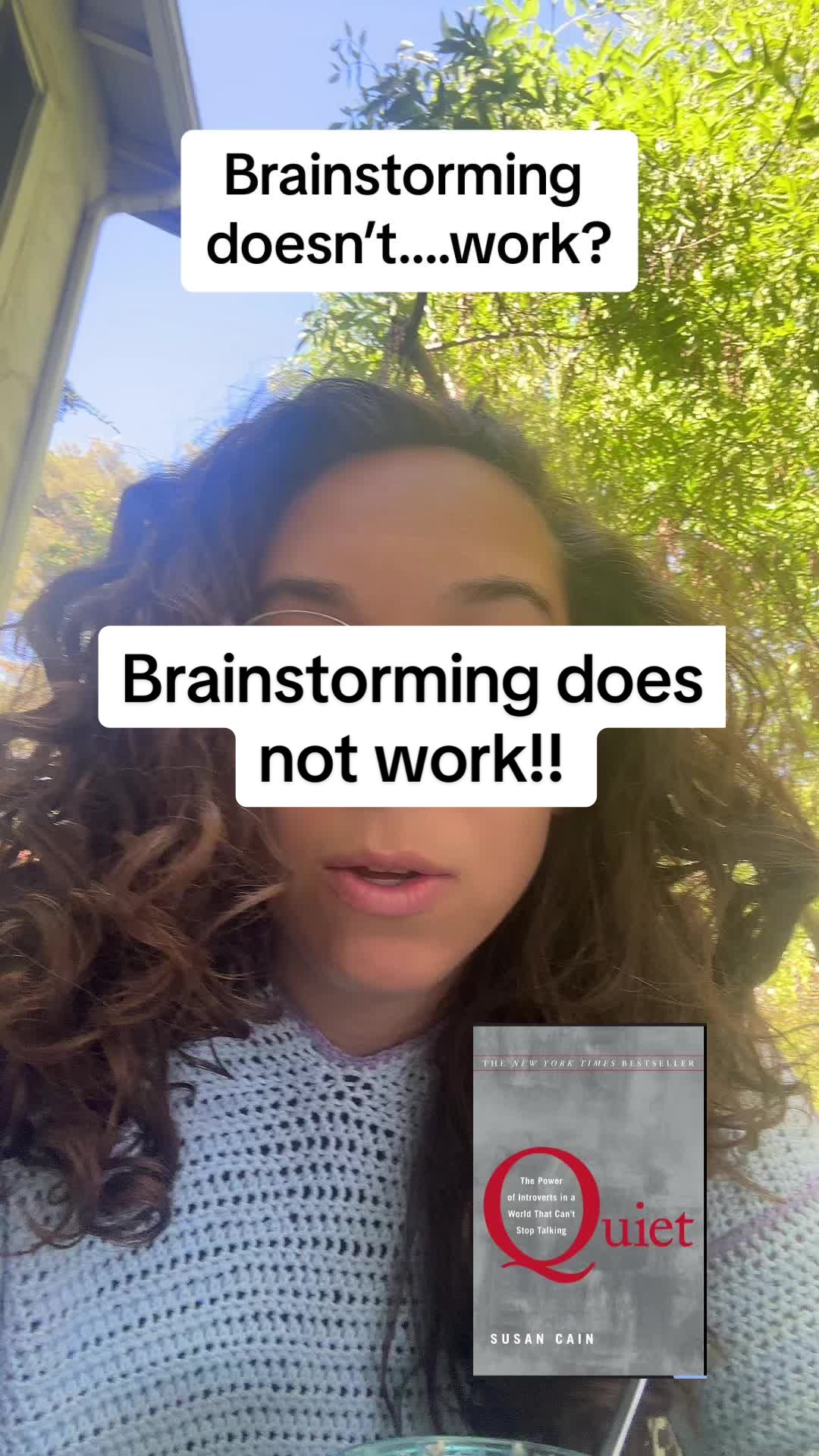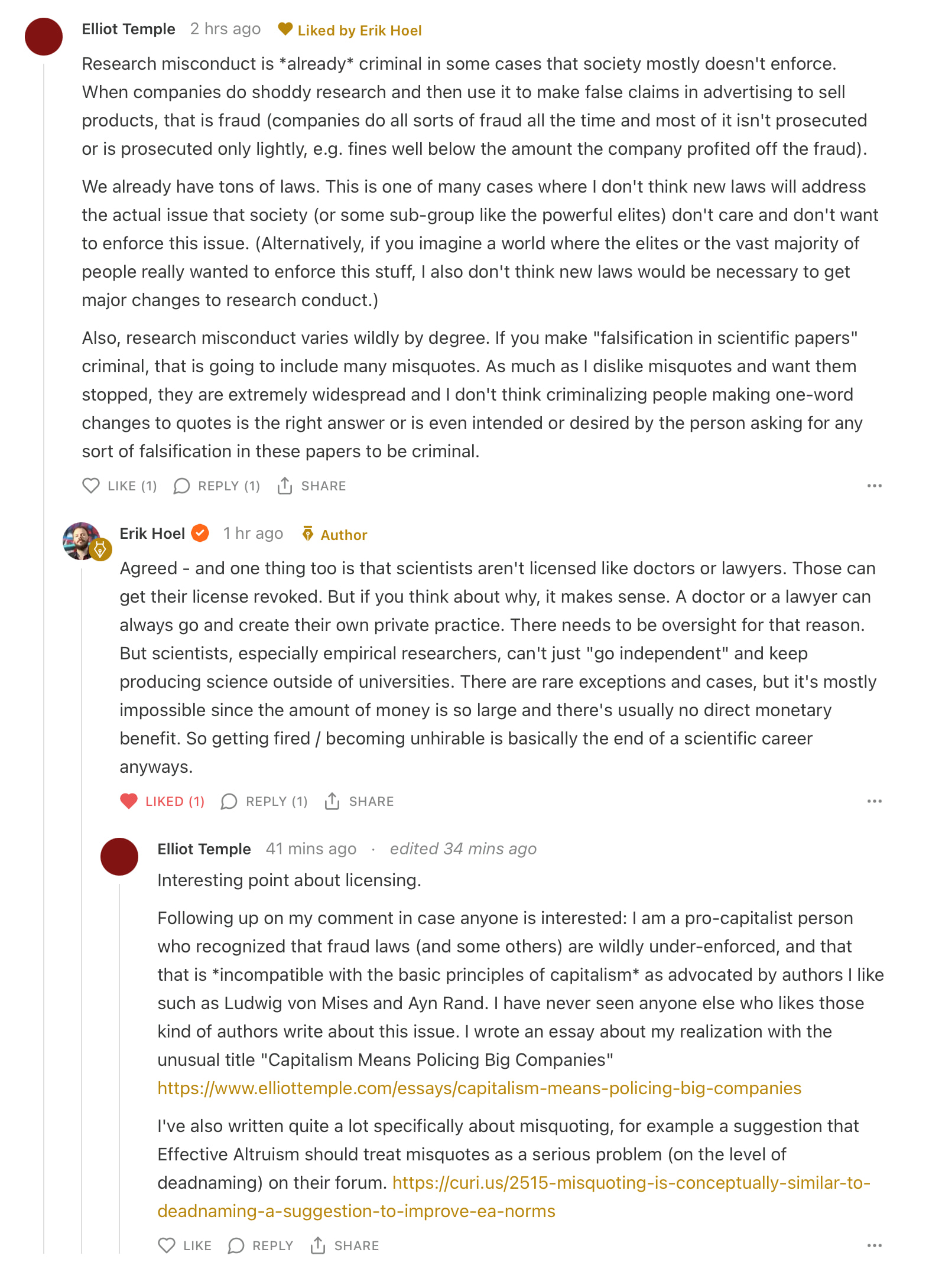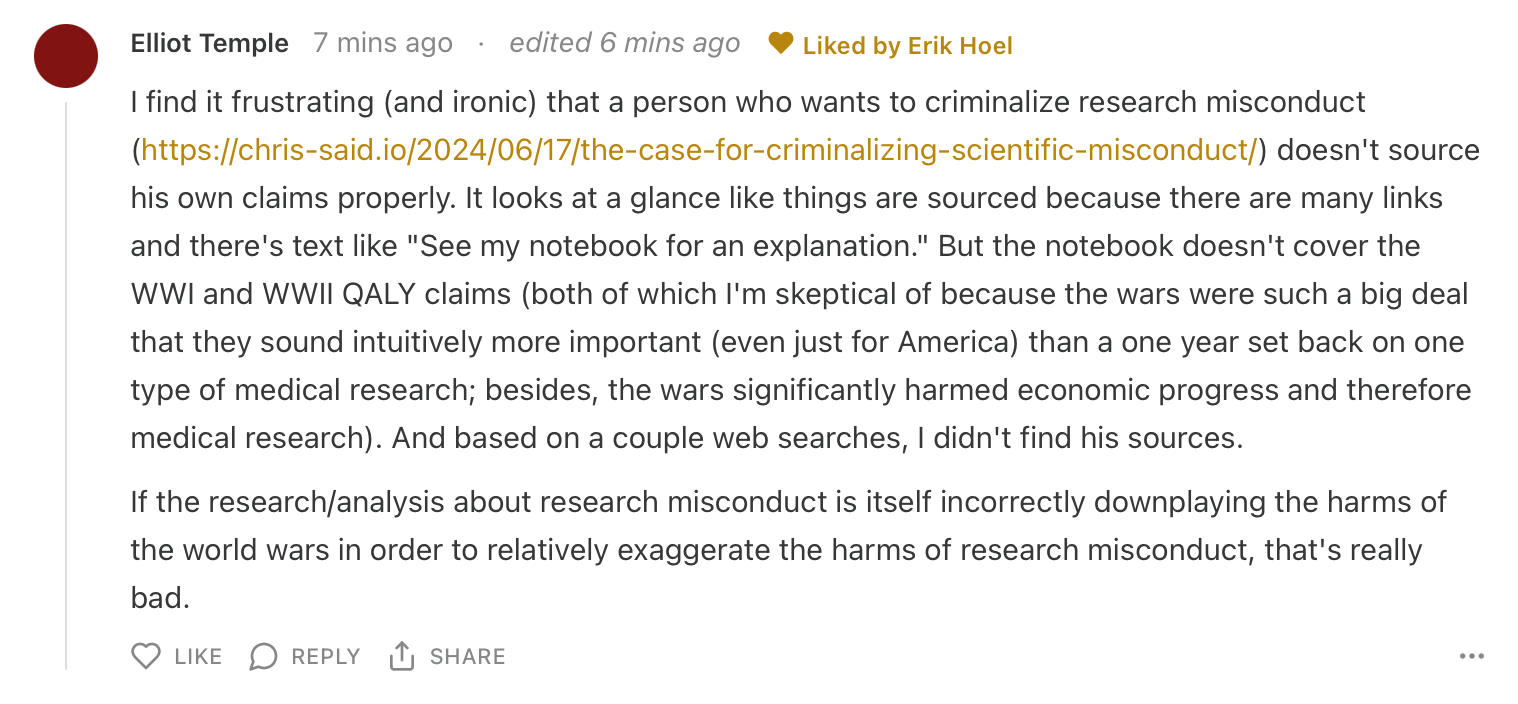Says basically working in in-person groups sucks but working in async, remote, online groups is good.
Quoting mathjax doesn’t work right automatically so I think it’s OK to use plain text of equations in quotes in simple cases where that only results in different formatting not a substantive difference.
Imagine if a quote like this example above, which appears to be generated by the forum software, was inaccurate. Imagine someone selected the text, clicked quote, then went and changed the words. That would be really bad, right? And it’d look intentional and easily avoidable. If someone said “I only made small edits that didn’t change the meaning”, that would be a terrible excuse which admits they did it on purpose. You shouldn’t edit the accurate, software-generated quote at all. Or if you have an important reason to edit it, indicate the edits with e.g. square brackets.
I think I view misquotes in general like this (unless they’re old or I otherwise expect them to have been copied from paper). By default, I expect quotes to be just as accurate as when you select text and press “quote” and software handles the rest, or alternatively when you use copy/paste. I think anything worse than that is unreasonable in general for stuff people post on the internet today. My intuitions about quoting were developed after copy/paste existed and were primarily developed by quoting electronic text (e.g. on email lists) not paper books, and when I do quote books today I usually use electronic copies (which are widely available for most books that anyone cares enough about to quote).
My stance on quoting may be aided by modern technology but the concept that quotes shouldn’t change any words is widespread and well known despite not being widely followed. The standard convention of not changing words in quotes is why the square bracket convention for indicating changes to quotes exists.
Trump’s election campaign looks really bad this time.
He’s anti-woke instead of anti-swamp. He appears to have become a mainstream Republican who gets along with most Republican politicians reasonably well. He also became more friendly to big corporations (that commit fraud).
He’s emphasizing “traditional” gender role stuff, anti-trans and anti-abortion.
He says basically if we elect him he’ll fix everything but if he knows how to do that why didn’t he do it during his first term?
Because of my past posts, I wanted to say that I don’t support Trump in 2024. I broadly dislike both major U.S. political parties and don’t plan to vote. I find most information sources on both sides awful.
Also, the longer Israel’s war goes, the more skeptical of it I am. Israel’s past wars being short was actually important to David Deutsch’s arguments about Israel that he persuaded me of. If Israel has/had no good plan to achieve important goals quickly, dropping a lot of bombs ineffectively for months seems probably worse than doing nothing. I am not reading news articles about this, I don’t know details, nor have I researched Israel’s old wars to see if what Deutsch told me about them was true. This topic isn’t a priority for me but I wanted to mention it because of Deutsch’s position and my past position. I’m more neutral and unsure than before.
If it was possible to get organized, rational debate, with knowledgeable people, about politics (or a ton of other topics) I’d probably be interested. But I don’t know how to get that.
Ghost (the software for the CF articles) added a tips and donations feature (one-time payments via Stripe). Here’s the link if you’d like to send me money (no account required).
Low context communication is important for philosophical topics, science or debates.
If people disagree, making assumptions about context can prevent discussion about the actual point of disagreement and cause confusion. People with substantial disagreements tend to disagree about some stuff that they would assume as context when walking with friends.
For scientific experiments to be repeatable or analyzable, they have to be documented in pretty clear, accurate, literal and complete way. That helps other labs, with people who are different than you, check your work. Having results checked by people in other countries, cultures or time periods increases the chance of finding an error you made. If your work was only double checked by people with a lot of similarity to you, who share a lot of unstated context with you, that’d be less effective: those people would be more likely to repeat rather than recognize the same assumptions and errors you made.
One of the many things Taking Children Seriously was wrong about is this:
There were often discussions of real or hypothetical problems that parents face and suggested non-coercive solutions.
The TCS solutions often involved high resource use in some way.
The unstated premise was that these problems were exceptions or outliers. Under that premise, putting high effort into a solution makes sense and works. Basically, TCS was teaching some crisis management ideas without labelling them that way.
However, if the problems are happening frequently, then using high-cost solutions repeatedly won’t work. You’ll run out of resources so you won’t be able to keep doing that, plus running out will cause other problems.
An example of a TCS solution would be offering your kids a trip to Disney Land to get them to stop fighting. This proves that there is a non-coercive way to handle that situation; the conflict isn’t literally impossible to resolve without coercion. And if you have a major problem once a year, you can use that style of solution. But if you have daily or weekly problems like most parents, then you’ll need to resolve almost all of them with solutions appropriate to daily life, not spend tons of resources on each problem like it’s a rare, exceptional crisis.
I don’t support Trump in 2024.
I commented on YouTube regarding misquoting at Misquote of Feynman | Analyzing The Beginning of Infinity, part 10
Here’s the Hacker News comment. Based on now searching the shorter quote given there, there are many results and it may be real. It looks like maybe the YouTube commenter added extra words so his version isn’t accurate.
I think there’s something interesting involved with:
- Being impressed by a prestigious book or author which you believe is smart and better than you are.
- Holding the smart book or author to the same low standards you have for yourself.
It looks like the person is defending misquoting in a book because he’s a misquoter and would do the same thing and doesn’t see a big problem (despite implicitly acknowledging the book is wrong). But if he’s a fan of the book, and thinks it’s high quality and written by someone super smart, why doesn’t he expect it to be better and more accurate than his own thinking?
It would seem natural to me, in at least some ways, for most fans of the book to feel betrayed if they found out it had misquotes and actually wasn’t the super-smart, better-than-they-could-do, highly-polished material they thought it was. I thought part of what people want in these kinds of books is for an expert who they can trust to explain advanced science and philosophy in layman’s terms. I suspect lots of people wouldn’t see it this way but I’m not clear on why.
Put another way: I thought they expected the book author to be pedantic and get details right, unlike themselves. But the YouTube commenter seems to have an attitude more like “picking on details is unfair” because he wouldn’t like someone doing that to him in debate with him. But I thought he would think scientist authors at major publishers could stand up to detailed scrutiny, not that it was unfair to use logic, detail-orientedness and intelligence to pick on them (they should have those traits and be able to hold their own). And books like this also have and at least one editor involved and sometimes a fact checker, so there’s at least one extra person involved, besides the author, whose paid job it is to be detailed-oriented and keep errors out of the book.
Also, if this was the only quoting-related error in the whole book, that’d actually be pretty good compared to most books. But it isn’t. There are lots more similar errors.
I’ve largely agreed with The Verge’s stance on this from the start, but I’ve also thought they’ve taken it to an almost comical extreme, insisting on attaching spokespeople’s names to even the most anodyne company statements. This West Point / ProPublica near-fiasco has me reconsidering my skepticism toward The Verge’s obstinacy on this.
The long article has context, but briefly:
John Gruber thought The Verge was being overly pedantic (“almost comical extreme”) by accurately attributing all quotes in their articles to specific people, even minor quotes, but he now thinks maybe they have a point (after a prominent example of someone from West Point providing false information).
I’ve long been in favor of accurate quoting, and been ridiculed for it (people sometimes view it as overly pedantic or comically extreme), so I thought this change of opinion, as well as The Verge’s policy, was notable.
I posted a Discourse feature request: Way to find parent post (not list of all ancestors scrolled to the top of the list) - Feature - Discourse Meta
Way to find parent post (not list of all ancestors scrolled to the top of the list)
I’d like a quick way to find the parent of a post. When you click the little icon to expand what’s being replied to, you sometimes get a dozen posts and get scrolled all the way up to the top of them (which is rarely what I want). I’d really like a reliable way to find and view the single, direct parent post (and then from there, a way to find its parent, and so on, one by one, as desired). I like and frequently use the “parent” links on Reddit and Hacker News, which accomplish this.
When you expand the ancestors, just scrolling you up to the start of the parent post, instead of the start of the oldest ancestor, would help. But it wouldn’t be a perfect solution because when you read the parent, and then want its parent, you’d have to scroll up through two posts to find the right place, and if they’re long and contain section headers you might miss the spot if going quickly. It’d be better if the software could take you to the right spot itself.
My most common use case for this is when people reply without using any quotations. If it’s a busy topic with multiple new posts since their last post, then I usually need to see one parent post to figure out what they’re talking about, but I usually don’t need to see any older ancestor posts.
EDIT: I’ve now changed the CF forum “max reply history” setting from 5 to 1, which helps.
Matthew Yglesias is an especially popular left wing Substack author who co-founded Vox. He has political contacts and deals with politics as his primary job. I find he generally has fairly reasonable, moderate takes. I occasionally read a bit of his writing.
In a recent post, we see him repeating a theme I’ve been watching out for and seeing a lot more often in the last year. I think it’s a really important and common error.
Question:
Wandering Lama: A couple of weeks ago you mentioned that if people wanted more CEOs to go to jail in the fallout of things like a financial crisis then congress should take action to help that happen.
1. Do you think it would be socially valuable for more C-level executives to go to jail over corporate related actions?
2. What reforms in particular would you like to see?
Answer with bold added by Elliot:
What I was saying is that there’s this myth that Obama “went soft” on bankers during his presidency, and the evidence supporting it is that nobody went to prison. But the reason nobody went to prison was they hadn’t committed crimes. That’s why so much time and energy was spent on passing Dodd-Frank and then on the subsequent agency-level rule making.
Now, a related point to that is that in general, the evolution of American legal doctrine has been to make it very difficult to secure convictions for white collar crimes. The Supreme Court has dramatically narrowed the permissible scope of “honest services theft” as a prosecutable offense, and white collar prosecutions generally require you to demonstrate that the defendant acted with criminal intent rather than making a mistake. This is hard to prove and means people can get away (criminally, at least) with all kinds of scammy conduct, as long as they don’t leave a paper trail explicitly demonstrating awareness that their conduct was scammy.
I don’t know that I have particularly good remedies for any of this. I’m really just saying that I think “he should have thrown bankers in jail” is a lazy and shallow critique of Obama.
I wish I could chat with someone who thinks this way for an hour because I think I could succinctly explain my disagreement (the really evil stuff companies do, which would be illegal in an ideal minarchist free market, actually already is against the law today too), and I have no idea what they would reply. I wouldn’t expect most people to just change their minds and agree with me and for my idea to easily spread and become the main view. But what do people disagree with? I can imagine some incoherent, nonsense or unreasonable replies. But is there any reasonable counter-point that I should address? Probably, but I don’t know what it is.
I think a lot of the issue is left wing people (and a lot of right wing people too) simply don’t know what is illegal in a free market. So my point of view, of thinking current laws are a superset of free market laws, wouldn’t work for them because they don’t realize that all this stuff they hate is illegal in a free market. If I told them it is, what would they say?
I fear the answers might just be practical concerns. First, that the government isn’t enforcing these laws. In that case, my main comment is it’s generally better to start enforcing existing laws rather than add additional redundant laws that are more about special cases. Second, that my concept of an ideal free market isn’t like relevant to the political discourse, it isn’t popular, it doesn’t matter, the MAGA people don’t want that either, just a few fringe libertarians, many of whom are shilling for companies like Wells Fargo and Amazon rather than complaining that those companies are breaking the rules of the free market. These answers aren’t wrong but they don’t actually detract from my intellectual point; they are in the general style of “intellectually you’re right but who cares, the world is a mess and truth isn’t super relevant” which is not a satisfying answer.
I feel like there’s a huge, widespread misconception by ~everyone about what capitalism is. Rand and Mises got it right but didn’t emphasize the key issues (and they wrote decades ago when the culture was different, so maybe they correctly emphasized what the key issues at the time were, and maybe the discourse shifted to stop being wrong about the stuff they emphasized and that’s how we got here where the key errors are in areas they didn’t emphasize).
Pro-capitalist people say we don’t live in a free market because we have too much government intervention. That’s true but I don’t think it’s the worst problem we have. I now think the bigger concern is we don’t actually enforce the rules of a free market. That’s a bigger, more important deviation from capitalism than having extra rules and extra taxes and a huge government and all the problems libertarians hate.
If I could change one thing, would I want to remove all the extra laws, and have low-regulation, low-tax-rate companies committing fraud with low barriers to entry for creating new companies? Or would I want to have overly-regulated companies, which are hard to start, and pay high taxes, but the fraud rate is very low? I think having a society with a low fraud rate sounds way better of those two options.
Also, I don’t know about what the courts actually do, but white collar prosecution shouldn’t (and I think as written in the old common law stuff, doesn’t) require proving criminal intent. And criminal intent vs. mistake is a false dichotomy. Recklessness or negligence should work too for prosecution. So mistakes in general aren’t illegal, but reckless, negligent or criminally-intended ones are, not just criminally-intended ones. I know in general that both recklessness and negligence get attention in law and are sometimes illegal. It’s really important to have lower standards than criminal intent, like these, in anti-fraud laws.
In the situation of your preferred option: if companies mostly stopped doing fraud because of enforcement then the companies could look like virtuous victims that libertarians think they are. They wouldn’t be doing most of the bad things center-left people criticize them for, and they would probably still be providing some good services. So they would mostly have a positive view in society while at the same time being heavily constrained by government. Classical liberals can then point out the companies are mostly good and at the same time being punished. So I could imagine this could lead to a more capitalist future.
Counter argument:
We did more government control of companies, now society is better. This proves we need to regulate the market. We should do even more control.
I’m not sure what would happen then.
I’m not sure about the premise, but let’s grant it.
This doesn’t logically imply we need more regulation. It suggests that one way to improve things would be more regulation and/or enforcement. (Logically, there may be many other solutions that would work too, and some of them may be even better.)
It also doesn’t differentiate whether the additional regulation and/or enforcement should only cover the basic rules of the free market, or should cover anything else too.
One way to improve enforcement of existing laws is if left-wing, anti-capitalist intellectuals stop saying or thinking that stuff is legal which is actually illegal. Why defend companies and executives, and claim they followed the law, when they didn’t?
And, in general, if enforcement isn’t working well, just adding more laws isn’t a great solution, because in that context (poor enforcement) you shouldn’t expect great enforcement of the new laws. You should investigate what is causing laws not to be enforced. Then you may figure out how to fix it. Or you might be able to figure out what hypothetical laws would and wouldn’t be enforced, and figure out what the pattern is, then make redundant new laws that you’re confident would be enforced (make enforceable versions of “no violence”, “no fraud”, etc.).
Anyway I don’t see any argument here against my claims that:
- the actions of the big banks during the financial crisis, and a lot of other bad actions by big companies in the last few decades, are already illegal according to the laws as written down
- many of the bad actions of companies are prohibited by the rules of the capitalist free market, aka are illegal under minarchism
- the many, many existing laws include all the rules of the free market, plus more
And I don’t quite get why a lot of people, on all sides (left, right, anti-capitalist, libertarian, MAGA, vegan haters of factory farms, etc.) think the big companies are following the law. I especially don’t understand it in cases where the person hates the company and its actions but still defends the company as lawful. Is it just ignorance of what laws exist or is there something else going on? Am I actually somehow wrong and a lot of the most basic laws of minarchism are not already existing laws (I’m not a legal scholar but I have never seen anyone argue that case; if such analysis exists I’d be interested). If we don’t even have the most basic laws that minarchists and strong free market advocates want, maybe we should create those laws; or if we have them but don’t enforce them, maybe enforcing those would be a good starting point; who, from what point of view, could object to that, other than anarchists?
I don’t have any arguments to the contrary, but I was surprised to hear that you thought that existing (US) laws contain all the free market laws of a minarchist society already. That’s not clear to me, but I am ignorant about this.
I’m surprised that you’re surprised. Which minarchist law do you think the US might not have? Can you list the minarchist laws?
I don’t really know. I don’t know what a list of minarchist laws would be. I know they would be the minimum necessary to protect and uphold individual rights. They’d embody the principles of private property and freedom and capitalism.
I didn’t have any specific minarchist law in mind that I think the US doesn’t have. I think that the US is not a thoroughly minarchist society, and I had assumed the issue there wasn’t just that there are a bunch of non-minarchist laws, but that there might be some minarchist laws missing.
I’d think a minarchist society would have a law preventing the creation of laws that would constitute the initiation of force? I don’t know if the US has something like that, or not.
Also, I didn’t mean to suggest, by saying that I was surprised, that I thought you believed something that was obviously wrong, or inconsistent with what I understand of your views. It was more like “Interesting, why does Elliot think that?”. I suppose I could’ve asked.
Ah, that’s not the type of law I was talking about.
Here are some of the kinds of laws which I think both minarchism and present-day USA have:
- no initiating violence
- no threat of violence
- no theft
- no fraud
- no false advertising
- no breach of contract
- no violating property rights
This is the kind of stuff the non-aggression principle is about.
I think these laws are adequate to claim that companies doing horrible things are broadly violating the law, not doing horrible but legal things.
These are laws directly protecting rights and establishing the rules within which the free market functions, not laws specifying the nature of the government.
Do you think that the US doesn’t have laws like these, or that minarchism requires a bunch of other laws regulating economic activity, or that companies are managing to do horrible things while not violating these laws? Or is this convincing?




